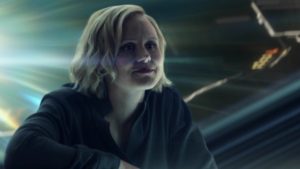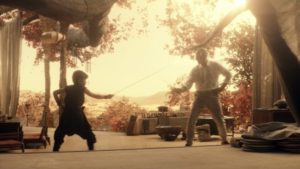It’s so empty. I mean, of course, right? It’s right there in the name: “space.” It’s not like it’s called “vast quantities of stuff.”
Although, come to think of it, there are over three billion stars in our galaxy alone and ours is one of two trillion; there are a septillion known planets, so maybe it should be called “vast quantities of stuff,” like, why focus on the negative?
—Dr. Agnes Jurati
 I’ve loved this show since the beginning. But when I first heard the Picard theme song, I was unimpressed. Star Trek themes are supposed to befit the sweeping desolation of space and loving pans over starships sailing the firmament, not broken shards of reality and sepia fields of grapes. This theme seemed to lack the awe of exploration that the Discovery theme has, it certainly didn’t pack the same derring-do that the Next Generation theme did, and the pastoral beginning just sounded like music for a man who had given up.
I’ve loved this show since the beginning. But when I first heard the Picard theme song, I was unimpressed. Star Trek themes are supposed to befit the sweeping desolation of space and loving pans over starships sailing the firmament, not broken shards of reality and sepia fields of grapes. This theme seemed to lack the awe of exploration that the Discovery theme has, it certainly didn’t pack the same derring-do that the Next Generation theme did, and the pastoral beginning just sounded like music for a man who had given up.
But when the theme song before “Absolute Candor” began, I realized something. It was something that I even put into my review of “Maps and Legends:” Picard had given up. Failure and inaction broke him down. Before meeting Dahj Asha he was, as he said, “waiting to die.”
Composer Jeff Russo pointed out in his interview on The Ready Room that the piccolo in the theme song is an allusion to his time as Kamin on the planet Kataan in “The Inner Light.” In using that flute sound as a touchpoint, Russo is pointing back to a version of Picard that got old but never lost his fire and need to do what is right. The theme isn’t just for a broken man. It’s for the rebuilding of a broken man. And in that (inner) light, it is perfect.
Picard is all about building Jean-Luc Picard back up again, from the shattered shards of chagrin, to once more make him “the Captain [we] remember.”
But Zhaban didn’t mention the logical conclusion of that wish: for Picard to be a captain, he’s going to need a crew.
Spoilers for “Absolute Candor” follow. This is a house of truth.
Drop in and pick yourself up a nun
You owe me a ship, Picard.
—Seven of Nine
 By the time we reach the end of episode 4, Picard has gathered himself a crew of six. They’ve all come aboard for different reasons and with different strengths; but your crew gathers for different reasons and with different strengths too, right?
By the time we reach the end of episode 4, Picard has gathered himself a crew of six. They’ve all come aboard for different reasons and with different strengths; but your crew gathers for different reasons and with different strengths too, right?
- Picard is aboard the La Sirena driven by the regret of two failures (that we know of): failing the Romulans in their darkest hour and failing Dahj Asha in hers. His charge into space is an attempt to make up for fourteen lost years.
- His begrudging navigator and former friend Raffi Musiker just wants to get to Freecloud. She doesn’t give much more detail than that, but it seems like she’s broken in some very real way and wants to escape her Earthly losses and pain.
- Cristóbal Rios, Picard’s hired pilot (as well as his lookalike emergency holograms) is a part of Picard’s “crew” by prudent choice; Picard is paying him—somehow—and while the ENH seems to suggest he might have more noble motives, that’s the only one he gives verbally.
- Picard’s synthetics expert and space novice Dr. Agnes Jurati joins with excitement and joy at seeing her life’s work finally validated; and while she gets bored quickly, she’s still the least jaded member of the La Sirena crew as of yet.
- His bodyguard Elnor, the “boy with the stick,” is finally recruited at the last moment; and though Picard knew him as a boy, it doesn’t seem like it’s a result of hero worship or nostalgia, but because the mission is a sufficiently lost cause, and his order is bound by duty to pursue lost causes.
- And in the last moments of the episode, fellow former Borg Seven of Nine finds her way aboard the La Sirena in a remarkable case of happenstance.
The strength of this crew is, like the strength of any Star Trek crew, in its diversity of passion and purpose. It shouldn’t surprise anyone, then, that this diversity is a Godly one. Some of us are driven by regret; others are broken and run to Jesus for escape, because they think it’s the most prudent idea, because they’re excited, because it’s their duty, or even by happenstance.
When Jesus gets us, he changes our hearts. But he doesn’t remove our unique abilities: our strong leadership, worldly skill and expertise, discernment. He wants us to grow in them, to use them in His service.
In fact, God has built the Church out of a diverse group for just that reason. The strength of the Church is in God creating a community of unity and diversity, one that makes no sense if He isn’t holding it together; Jews and Gentiles, rich and poor, black and white. The apostle Paul calls the assembled group of people “coheirs, members of the same body” (Ephesians 3:6, CSB) and notes that “if they were all the same part, where would the body be?” (1 Corinthians 12:19, CSB)
It’s messy, it’s broken, and it kicks up strife all the time—not only is the Church’s unity supposed to shine through all of its dysfunction, it’s also supposed to create a powerful force that God uses to right wrongs, preach the Gospel, and literally change the world; and do all this so well that it even sends a message to the heavens (Ephesians 3:10).
Oh, is that all?
One Impossible Thing at a Time
Man can’t even take a guilt trip without using a starship.
—Raffi Musiker
 The things God has commanded the Church to do are exclusively impossible. There aren’t any that are easy.
The things God has commanded the Church to do are exclusively impossible. There aren’t any that are easy.
Know the depths of our sin, but still rejoice? Be repentant, but not wracked with guilt? He’s called us to love one another inside the Church—and that’s hard enough, have you met church people?—but also those outside the church. He’s called us to care for widows and orphans, to extend mercy, to teach the entire world about Jesus and His love. He’s called us to heal, to sit with people in their sickness and pain, to give up everything for the sake of others and still have joy.
Any one of those things would be impossible. But God made the Church to do them all, all the time. To be honest, I’d rather face the Tal Shiar and save an illegal android; at least then, I could have a cool sword. Instead, all I get is a growing understanding of my own sinfulness.
It’s impossible. A lost cause. But is there any doubt that it is right? That it is worthwhile? That we will have victory? That God has chosen the people who have the strengths He wants at the places and times He wants them?
Christ assures us that our crew has been founded by God upon the very promise of the power to do what God has prepared for us to do; an impossible task that we’re uniquely made to do. His commands aren’t just marching orders, they’re given with a promise that we won’t be flailing in the wind because like our salvation, successfully accomplishing this task “is not from yourselves; it is God’s gift—not from works, so that no one can boast. For we are his workmanship, created in Christ Jesus for good works, which God prepared ahead of time for us to do.” (Ephesians 2:8-10, CSB)
This isn’t easy. And it doesn’t mean subsuming our passion and purpose; it means being united as a crew, not assimilated as a collective. It means being for one another and for the mission of the church, but it doesn’t mean we can’t call the unhealthy members of the Body to repentance.
Throughout history, the healthy Church repents its way into looking like that: diverse, unified, unique, of one accord. When the Church isn’t healthy, you’ll often find that it’s dissolved into little tribes and factions, fighting and sniping at one another from our circled wagons rather than helping to make the world a better place. But that’s never been the plan; we’re supposed to be united, and we have the resources to actually be a united crew.
God shows us a vision of a beautiful new world, and through a God-given diversity and unity, we will make it so.


